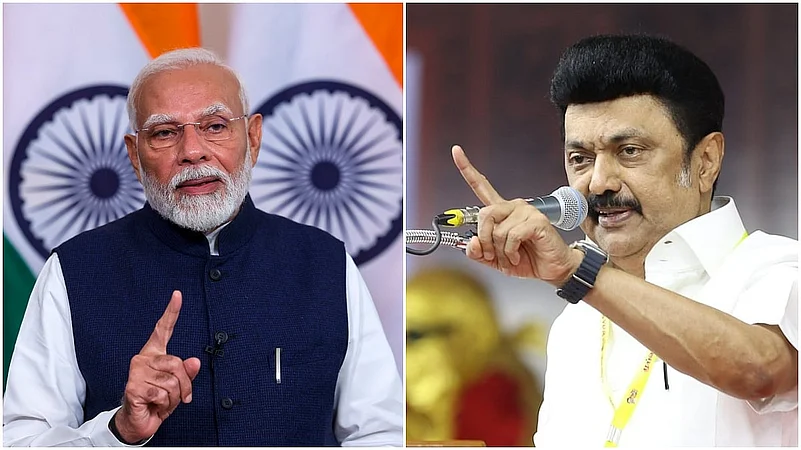As the delimitation row continues, Prime Minister Narendra Modi has taken a swipe at Tamil Nadu Chief Minister MK Stalin.
Addressing the crowd after inaugurating Tamil Nadu's Pamban bridge on Sunday, the PM mocked the opposition government and said they are "people who cry for no reason."
Modi's jibe comes amid MK Stalin's demand for a fair delimitation and the three-language row.
Ahead of Modi's speech, Stalin called on the prime minister to ensure the Parliament passes a resolution to safeguard Tamil Nadu's rights.
"Modi should make this promise publicly, allay the fears in the minds of the people of Tamil Nadu, and follow it up with a constitutional amendment in Parliament. This is the only way to ensure a fair delimitation. I sincerely hope he will act," said Stalin.
Speaking at an event in Ooty, the DMK leader further stated that he has sought a meeting with Modi to submit a "memorandum" about the state's delimitation concerns.
Addressing the south's concerns regarding delimitation, Union Home Minister Amit Shah assured that the seats for the South will not be reduced. Speaking at an event in Coimbatore, Shah stated the following -
"I want to reassure the people of South India that Prime Minister Narendra Modi has kept your interest in mind and will make sure that not even one seat is reduced. And whatever increase is there, southern states will get a fair share, there is no reason to doubt this."
What Is The Delimitation Row?
With the deadline of the 2026 census approaching, several southern states, led by Tamil Nadu, have called on the Union government to carry out a fair delimitation exercise.
Delimitation refers to the redrawing of parliamentary and assembly constituencies based on the population of states. The exercise focuses to maintain and preserve the mandate of "one person-one vote."
Why Are Southern States Against It?
After the delimitation process was frozen by former Prime Minister Indira Gandhi during the Emergency Period, population control measures were implemented.
While these measures were successfully implemented in the southern states, North India lagged behind.
Southern states now had smaller populations, prompting them to oppose the constitution of a delimitation commission after the 2001 census, hence causing the extension till 2026.
With the deadline of delimitation nearing and India's population speculated to reach 1.42 billion by 2026, states such as Tamil Nadu, Karnataka, Andhra Pradesh, Kerala and others have once again raised their concerns.
The process of delimitation may lead to a reduction or an increment in seats across states. As per various studies conducted on delimitation, by 2026, Karnataka is expected to see an increase in seats from 28 to 36.
Similarly, in Andhra Pradesh, the seats are expected to increase from 25 to 28, Tamil Nadu from 39 to 41 and Telangana from 17 to 20 seats.
On the other hand, northern states could see a drastic increase in their seats. By 2026, Uttar Pradesh is expected to increase from 80 to 128 seats. Bihar follows closely with a likely increase from 40 to 70 seats.
Along with Stalin, several leaders from the south have raised their objection to the exercise.
YSRCP President and former Andhra Pradesh Chief Minister YS Jagan Mohan Reddy echoed a similar tone and urged that the delimitation exercise should be done "without reducing any state's representation."
Adding to the sentiment, Karnataka Chief Minister Siddaramaiah warned that a new exercise "would severely disadvantage the southern states" and urged for the delimitation to be based on the 1971 census.














